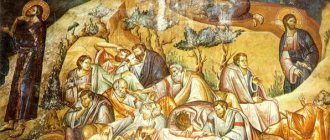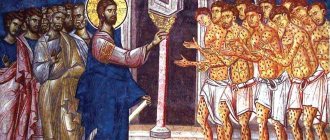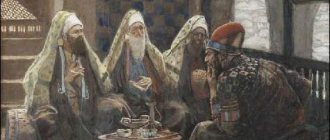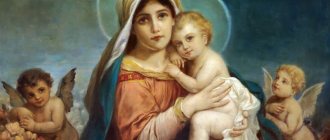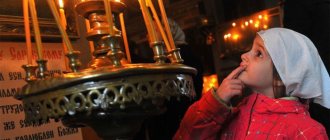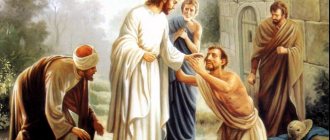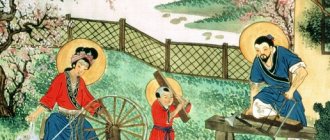Betrayal
It is possible that already at that very moment He saw the approaching torchlights. These were armed soldiers led by Judas. “He who eats bread with Me has lifted up his heel against Me” (John 13:18).
When Judas approached Jesus, he not only greeted Him, but also “kissed Him” (Matthew 26:49).
In an attempt to prevent Jesus from being arrested, Peter raised his sword and cut off the right ear of Malchus, the priest's servant. However, Jesus, touching his ear, healed him, adding: “Do you think that I cannot now ask My Father, and He will present Me with more than twelve legions of angels?” (Matthew 26:53). For the moment had come when heaven should not interfere, and Jesus should have allowed what was written in the scriptures to be fulfilled.
When the soldiers seized Jesus, “they saw before them a weary, unarmed man, betrayed by one of His closest companions, and whose arrest was painfully and hopelessly watched by a handful of terrified Galileans.” This was the beginning of a long, hard night of interrogation. First, He was taken to the dissolute, greedy Annas, a former high priest who had served for seven years. Being one of the most depraved people on earth, he brought to power and controlled the current high priest, who carried out his every word.
Interesting facts about the Garden of Gethsemane
At the foot of the western slope of the Mount of Olives, in the Kidron Valley, was the village of Gethsemane. In Hebrew, its name meant “olive press.” Around the village there were orchards of olive trees. The fruits were collected from them and brought to the press located in the village. Here they squeezed out the oil.
In all four Gospels one can find a mention that Jesus Christ regularly visited the Garden of Gethsemane with his disciples at the foot of Mount Maslenitsa. Now this place, associated with biblical events, is regularly visited by pilgrims.
Oil press location
Just as everything created in the world testifies to us about the Savior, so the Garden of Gethsemane - where the olive oil was pressed - bears quiet testimony about that terrible night. Olive oil was very important in the life of the people of Israel. Thanks to the olive oil used in the lamps, it was possible to light a light on a dark night. Olive oil served as a healing balm for wounds, and olive pulp was used as fuel. But the only way to obtain olive oil was to subject the olives to great pressure by crushing them in a stone press. Under this weight, the olives, although initially bitter, produced oil that tasted sweet.
So it is with the Atonement. From the bitterness of that night came something precious and sweet - something that gives light in the night. When we are anointed with blessed oil, Healing comes to us through the sacrifice of Christ, who had to endure the pressure of the press to give us a healing balm for our wounds.
Jesus asked His apostles Peter, James, and John to stay awake, but twice He found them “sleeping for sorrow” (Luke 22:45). He said to them, “Could you not watch with Me for one hour?” Then he added, taking pity on them: “The spirit is willing, but the flesh is weak.” And finally, for the third time, He found them sleeping and said: “Are you still sleeping and resting? behold, the hour has come, and the Son of Man is being delivered into the hands of sinners” (Matthew 26:41-45).
